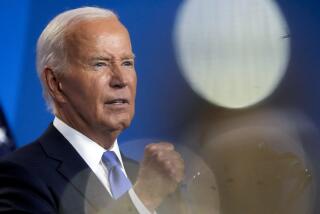Tensions Escalate as Southern Baptist Conference Nears
- Share via
Conservatives who won the battle for control of the Southern Baptist Convention are finding the strife is not over in the nation’s largest Protestant denomination.
The firing of a popular seminary president and the growing strength of a splinter group have placed the Southern Baptist Convention at its most significant crossroads since the conservative takeover of the denomination, some observers say.
For the first time since 1990, when moderate Baptists mounted a serious challenge to the new conservative leadership in the convention, there is a close presidential race. Only this time both candidates are conservatives, with one favoring closer cooperation with Southern Baptists who are disaffected with the current leadership.
An expected 25,000 delegates to the three-day convention opening Tuesday in Orlando, Fla., also may consider proposals to encourage church agencies to cut financial ties with the moderate Cooperative Baptist Fellowship and to ask for the resignations of the trustees who voted to fire Southwestern Baptist Theological Seminary President Russell H. Dilday Jr.
What once looked like a routine meeting that would offer church leaders and their families extended time at Disney World has taken a serious turn, said James Hefley, a columnist for the Indiana Baptist who has written six books on the Southern Baptist controversy.
“The Dilday affair is the wild card this year,” he said. “This Orlando thing is not a Mickey Mouse thing anymore.”
Since the mid-1960s, the 15.4-million-member Southern Baptist Convention more than doubled in size to surge past the declining United Methodist Church as the nation’s second-largest denomination after the 59-million-member Roman Catholic Church.
But growth has not come easy in the 1990s. The convention grew by less than 1% last year. After losing a series of presidential elections, moderates in 1991 formed their own group, the Cooperative Baptist Fellowship. The fellowship has grown rapidly, from 391 churches in 1991 to 1,210 churches in 1993.
The theological differences between moderates and conservatives often fall into a gray area, but in general conservatives tend to emphasize their belief in the literal truth of the Bible, while moderates would place greater emphasis on the ability of believers to interpret the Bible on their own. On church issues, for example, moderates would be more likely to support the ordination of women or biblical scholarship that views some passages as parables rather than historical truths.
Most of the fellowship’s members still belong to the Southern Baptist Convention, but are increasingly giving more of their funds to non-SBC causes such as the Baptist Theological Seminary in Richmond, Va. For example, fellowship churches designated 59% of their $4.5 million in 1991 contributions to Southern Baptist agencies, but only 25% of the $11.2 million that they gave in 1993 went to the convention.
Although the Cooperative Baptist Fellowship has not officially declared itself a separate denomination, some convention leaders are already considering it one, and are proposing to cut all financial ties even if it means some financial belt-tightening. The convention received $136.5 million for its Cooperative Program in 1993 from nearly 39,000 churches.
The Rev. Fred Wolfe, head of the denomination’s Executive Committee, said it would give credibility to the Cooperative Baptist Fellowship to continue taking their money.
“I expect them within the next couple of years to be a new denomination,” he said.
But the Rev. Cecil Sherman, fellowship moderator, said that not accepting their money would only drive some churches farther away from the convention.
“That would have the effect of enlarging the fence, the chasm, between us,” he said. “If things like this continue over a long enough period of time, this will lead to a separate body.”
The presidential election between Wolfe, who has been endorsed by the conservative leadership, and the Rev. Jim Henry of Orlando may offer a bellwether of the direction the convention is going to take.
“I know that my election would be a signal the conservative resurgence is going to continue in the direction it is going,” said Wolfe, the pastor of Cottage Hill Baptist Church in Mobile, Ala.
Henry, head of First Baptist Church of Orlando, says his presidency would focus on “healing what has been hurt, and saying let’s get on with the program.”
Unlike Wolfe, he favors continuing to accept money from the moderate fellowship as long as no other strings are attached.
Although Wolfe has been endorsed by many current convention leaders, Henry has the backing of Dilday.
The March firing of Dilday, who led Southwestern seminary in Ft. Worth for 15 years, has aroused passions and criticism even among conservative Southern Baptists.
The trustees said Dilday assailed individuals who believed in the literal truth of the Bible, but opponents said he was let go simply for being open to moderates and criticizing the hardball politics of the current conservative leadership.
“The timing of (the trustees’) action was tragic,” said the Rev. Cecil Sims, sponsor of a resolution asking for the resignations of the trustee officers who supported Dilday’s firing. “The convention had begun to have a little bit of the healing spirit, and this just reopened the whole problem.”
More to Read
Sign up for Essential California
The most important California stories and recommendations in your inbox every morning.
You may occasionally receive promotional content from the Los Angeles Times.













